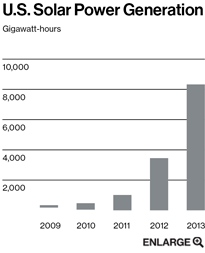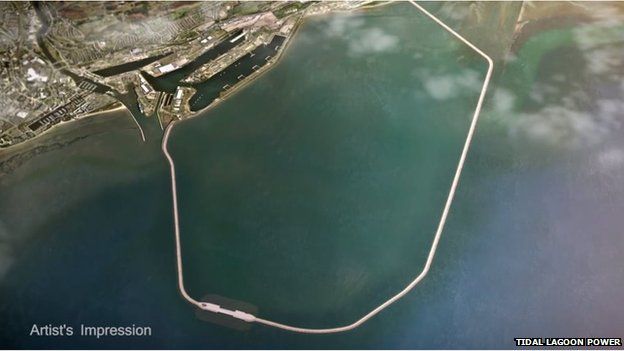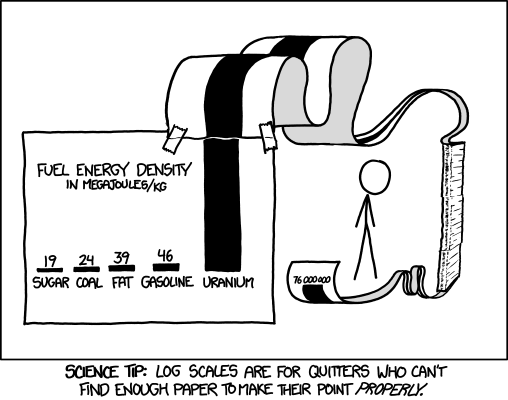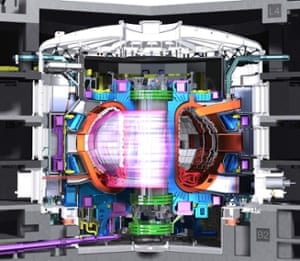Renewable Energy
Solar power is a very viable solution to producing abundant energy,
the price of solar panels have been
lowering,
 Solar Power Price Decreases -
Solar panel prices dropped by two-thirds since early 2011 according to CompareMySolar research. A 4kWp system (16 solar panels) that used to cost £15.000 is currently available for just above £5.500.
And it's more than 100x cheaper than it was 35 years ago
while the efficiency have been increasing.
As well as being placed on roofs for generating a supply of electricity to a home,
invisible cells can be put on windows to power
skyscrapers.
Solar Power Price Decreases -
Solar panel prices dropped by two-thirds since early 2011 according to CompareMySolar research. A 4kWp system (16 solar panels) that used to cost £15.000 is currently available for just above £5.500.
And it's more than 100x cheaper than it was 35 years ago
while the efficiency have been increasing.
As well as being placed on roofs for generating a supply of electricity to a home,
invisible cells can be put on windows to power
skyscrapers.
 Transparent Solar Cells -
Silicon Valley startup Ubiquitous Energy is making the world’s first transparent solar cells, a technology that could greatly expand the reach of solar power.
Their technology is an invisible film that can go on any surface and generate power, which could lead to cell phones and tablets that never run out of
batteries — or skyscrapers that can use their massive banks of windows as solar panels.
Large scale
solar factory's
Transparent Solar Cells -
Silicon Valley startup Ubiquitous Energy is making the world’s first transparent solar cells, a technology that could greatly expand the reach of solar power.
Their technology is an invisible film that can go on any surface and generate power, which could lead to cell phones and tablets that never run out of
batteries — or skyscrapers that can use their massive banks of windows as solar panels.
Large scale
solar factory's
 Solar Factory's -
SunEdison plans to build a massive, $4 billion solar equipment factory in India, Its government wants to see 70 gigawatts of solar generation projects installed by 2017.
can be built which make good investments for companies.
There are now solar power stations that can be maintained with much less human input, where the panels are cleaned without any water by
robots
Solar Factory's -
SunEdison plans to build a massive, $4 billion solar equipment factory in India, Its government wants to see 70 gigawatts of solar generation projects installed by 2017.
can be built which make good investments for companies.
There are now solar power stations that can be maintained with much less human input, where the panels are cleaned without any water by
robots
 Cleaned Without Water -
Israeli startup makes robots that dry clean solar panels, In dusty areas such as the Middle East and India, solar panels could lose electricity
production by 10 percent to 35 percent over time if they remain unwashed, the startup projects that its equipment and services
could save 840 million liters of water for a 300 MW solar park over 20 years while increasing electricity sales by $180 million.
Solar power is becoming such a good energy supply that Google have
invested
Google Invested -
Google is contributing to a SolarCity fund valued at $750 million,
the largest ever created for residential solar.
Google has now committed more than $1.8 billion to renewable energy
projects, including wind and solar farms on three continents.
This deal, which may have a return as high as 8 percent.
$300Billion into Elon Musk's Solar City company.
There is much room for improvement in solar, the study of photosynthesis could lead to a better
understanding and way to use the
suns energy
Cleaned Without Water -
Israeli startup makes robots that dry clean solar panels, In dusty areas such as the Middle East and India, solar panels could lose electricity
production by 10 percent to 35 percent over time if they remain unwashed, the startup projects that its equipment and services
could save 840 million liters of water for a 300 MW solar park over 20 years while increasing electricity sales by $180 million.
Solar power is becoming such a good energy supply that Google have
invested
Google Invested -
Google is contributing to a SolarCity fund valued at $750 million,
the largest ever created for residential solar.
Google has now committed more than $1.8 billion to renewable energy
projects, including wind and solar farms on three continents.
This deal, which may have a return as high as 8 percent.
$300Billion into Elon Musk's Solar City company.
There is much room for improvement in solar, the study of photosynthesis could lead to a better
understanding and way to use the
suns energy
 Suns Energy -
The very best photovoltaic cells, the kind seen on many roofs, convert sunlight to electrical energy with an efficiency of around 35%; for more affordable cells the figure is closer to 20%. Plants accomplish the same process with about 90% efficiency during the first stage of photosynthesis
, with more
funding
Investment -
Cheaper renewable power means it will be much cheaper to plug in your car than fill it up at the gas station.
It may be one of the reasons why some, like Saudi businessman Prince Alwaleed bin Talal, believe we will never see $100 oil again. And it may also be why
investment banks such as Goldman Sachs plans to invest in excess of $40 billion in renewables by 2021.
and research who knows what could be capable...
Suns Energy -
The very best photovoltaic cells, the kind seen on many roofs, convert sunlight to electrical energy with an efficiency of around 35%; for more affordable cells the figure is closer to 20%. Plants accomplish the same process with about 90% efficiency during the first stage of photosynthesis
, with more
funding
Investment -
Cheaper renewable power means it will be much cheaper to plug in your car than fill it up at the gas station.
It may be one of the reasons why some, like Saudi businessman Prince Alwaleed bin Talal, believe we will never see $100 oil again. And it may also be why
investment banks such as Goldman Sachs plans to invest in excess of $40 billion in renewables by 2021.
and research who knows what could be capable...
Wind Turbines are increasing in
efficiency
 Wind Energy -
Longtin said. "If you go back 10 years ago, the turbine was at about 25 percent capacity factor. Today, it's over 50 percent. As we've improved the capacity factors and improved the cost of energy, that enables us to go into more and more locations where the wind is lower."
Computer simulation can be useful to companies as they look to increase the capacity factor of turbines.
and lowering in costs as parts get cheaper, more reliable and perform better.
Big data and artificial intelligence are producing ultra-accurate
forecasts
offshore
Wind Energy -
Longtin said. "If you go back 10 years ago, the turbine was at about 25 percent capacity factor. Today, it's over 50 percent. As we've improved the capacity factors and improved the cost of energy, that enables us to go into more and more locations where the wind is lower."
Computer simulation can be useful to companies as they look to increase the capacity factor of turbines.
and lowering in costs as parts get cheaper, more reliable and perform better.
Big data and artificial intelligence are producing ultra-accurate
forecasts
offshore
 Smart wind and Solar -
At NREL, researchers can plug 30 electric cars into docks that let them interface
with power-grid simulations on a supercomputer, to project what would happen
if thousands of cars were connected to the grid. The idea is that electric cars
might store power from solar panels and use it to power neighborhoods when
electricity demand peaks in the evening, and then recharge their batteries
using wind power in the early morning hours.
that will
make it feasible to integrate much more renewable energy into the grid.
There also ways to generate energy for countries with coastline by using
offshore
Smart wind and Solar -
At NREL, researchers can plug 30 electric cars into docks that let them interface
with power-grid simulations on a supercomputer, to project what would happen
if thousands of cars were connected to the grid. The idea is that electric cars
might store power from solar panels and use it to power neighborhoods when
electricity demand peaks in the evening, and then recharge their batteries
using wind power in the early morning hours.
that will
make it feasible to integrate much more renewable energy into the grid.
There also ways to generate energy for countries with coastline by using
offshore
 Offshore Wind Energy -
Current initiative in Europe for offshore wind Turbines which once completed, the 12 offshore projects currently under construction will
increase installed capacity by a further 2.9 GW, bringing the cumulative capacity in Europe to 10.9 GW.
Offshore Wind Energy -
Current initiative in Europe for offshore wind Turbines which once completed, the 12 offshore projects currently under construction will
increase installed capacity by a further 2.9 GW, bringing the cumulative capacity in Europe to 10.9 GW.
Analysing public data on offshore wind in Denmark, energy consultant Mike Parr concludes that existing
offshore wind is already cheaper than gas-fired power plants. Future offshore wind farms will be cheaper still – and up to 60% less expensive than
the proposed nuclear power plant at Hinkley Point C in the UK.
wind turbines or by utilising the energy from the sea such as
wave power
 Wave Power -
World’s first grid-connected wave power station switched on in Australia
It also supplies zero-emission desalinated water. The company’s larger CETO 6 units, which are already being developed,
are expected to have four times the power generating capacity.
or using
tidal energy.
Wave Power -
World’s first grid-connected wave power station switched on in Australia
It also supplies zero-emission desalinated water. The company’s larger CETO 6 units, which are already being developed,
are expected to have four times the power generating capacity.
or using
tidal energy.
 Tidal Energy. -
Plans to generate electricity from the world's first series of tidal lagoons
have been unveiled in the UK. It says the series of six lagoons could generate 8% of the UK's electricity for an investment of £30bn.
Other renewable energy sources such as
Bio,
UK: Renewables overtake nuclear -
Renewable energy generated 19.2% of the U.K.'s electricity in 2014,
government figures show, surpassing nuclear generation for the first time ever.
Tidal Energy. -
Plans to generate electricity from the world's first series of tidal lagoons
have been unveiled in the UK. It says the series of six lagoons could generate 8% of the UK's electricity for an investment of £30bn.
Other renewable energy sources such as
Bio,
UK: Renewables overtake nuclear -
Renewable energy generated 19.2% of the U.K.'s electricity in 2014,
government figures show, surpassing nuclear generation for the first time ever.
The single biggest green electricity technology feeding the U.K. grid
is bio energy, which contributed 36% of the 64.4 TWh of renewable power in 2014.
Geothermal
 Geothermal -
Geothermal holds some pretty serious potential. In trying to predict what a clean energy future looks like, some, like the cleantech wiz Saul Griffith,
figure geothermal will eventually account for around 1/6th of the world's power supply. Others, like the IPCC, think it will clock in at 4%.
Either way, it will be an integral part of the renewable energy mix powering the world, as fossil fuels recede from view.
and
Hydroelectric
Hydroelectric -
The Central American country has been able to rely on hydroelectric power for the
first three months of the year thanks to heavy rainfall
offer even more ways to generate clean non polluting electricity.
Geothermal -
Geothermal holds some pretty serious potential. In trying to predict what a clean energy future looks like, some, like the cleantech wiz Saul Griffith,
figure geothermal will eventually account for around 1/6th of the world's power supply. Others, like the IPCC, think it will clock in at 4%.
Either way, it will be an integral part of the renewable energy mix powering the world, as fossil fuels recede from view.
and
Hydroelectric
Hydroelectric -
The Central American country has been able to rely on hydroelectric power for the
first three months of the year thanks to heavy rainfall
offer even more ways to generate clean non polluting electricity.
Nuclear Energy
While nuclear power is non renewable, produces radioactive waste and can lead to disasters such as the one in Chernobyl and Fukushima, it is still one of the
best
 Fuel Density -
This XKCD comic helps to visualise the fuel density of nuclear power compared to other fuels
energy sources to choose from, and unlike solar or wind, it is reliable.
There are designs for new safer plants and reactors that are ready to be built that offer even more benefits,
examples such as using Thorium as a fuel or making current Uranium even more efficient,
much more research and investment could still be done to
improve
Fuel Density -
This XKCD comic helps to visualise the fuel density of nuclear power compared to other fuels
energy sources to choose from, and unlike solar or wind, it is reliable.
There are designs for new safer plants and reactors that are ready to be built that offer even more benefits,
examples such as using Thorium as a fuel or making current Uranium even more efficient,
much more research and investment could still be done to
improve
 Bill Gates -
"Right now there isn't enough R&D going into safe and cheap nuclear energy. I am supporting Terrapower which has
a 4th generation design that looks good. It uses the 97% of Uranium that normally can't be used for a reactor by breeding and burning.
This means fuel will always be cheap.
Bill Gates -
"Right now there isn't enough R&D going into safe and cheap nuclear energy. I am supporting Terrapower which has
a 4th generation design that looks good. It uses the 97% of Uranium that normally can't be used for a reactor by breeding and burning.
This means fuel will always be cheap.
There are a lot of innovations but the key
one is that it is far far safer than anything today - not relying on human operators"
nuclear fission.
Around
13%
 Nuclear Power -
Around 13% of the world's electricity is produced from nuclear energy,
Nuclear Power -
Around 13% of the world's electricity is produced from nuclear energy,
In 2013, the IAEA report that there are 437 operational nuclear power reactors.
According to Dr Jonathan Cobb at the World Nuclear Association (WNA), there are 70 nuclear reactors under construction, "the highest number in 25 years".
There are a further 500 proposed plants - far more than are operating in the world today.
of the world's electricity is produced from nuclear energy.
The most powerful nuclear plant today is the Bruce Nuclear Generating Station in
Canada
Nuclear Power in Canada -
Canada’s nuclear reactors contribute C$6.6 billion per year to GDP,
create C$1.5 billion in government revenue and generate some $1.2 billion
in exports.
About C$13.26 billion (in 2005 dollars) was invested by the government in Canada's nuclear program over 1952-2006 through AECL.
This investment has generated more than C$160 billion in GDP benefits to Canada.
which has a
capacity
of 7,276 MW.
Currently, the world’s population consumes 15 terawatts of power and is set to
increase
 Power Consumption -
For example, Americans make up less than 5 percent of the world’s population yet consume 26 percent of the world’s energy
as more of the word’s population become more rich.
If you take as estimate and say in the next 20 years the global consumption doubles.
To power the whole world in 20 years time, *just* using Bruce plants you would need to build 4123 at an
estimated
cost
Power Consumption -
For example, Americans make up less than 5 percent of the world’s population yet consume 26 percent of the world’s energy
as more of the word’s population become more rich.
If you take as estimate and say in the next 20 years the global consumption doubles.
To power the whole world in 20 years time, *just* using Bruce plants you would need to build 4123 at an
estimated
cost
 Basic Cost Calculation
Hypothetically, to provide electricity for the whole world from a clean slate, just using nuclear power, you would need to have 4123 nuclear plants similar to the Bruce Plant
30 TW / 7,276 MW = 4 123.14458.
Final costs of the Bruce Plant are estimated at $7 billion.
$7 billion * 4 123.14458 = $28.9 trillion.
of $28.9 trillion.
Now the cost of running solely nuclear power does look incredibly expensive way to generate energy but
The International Energy Agency (IEA), says the
world will need to stump up about $23 trillion over the next 20 years
to finance continued fossil-fuel extraction, not to mention the cost of all the ecological damage fossil fuels have caused.
Basic Cost Calculation
Hypothetically, to provide electricity for the whole world from a clean slate, just using nuclear power, you would need to have 4123 nuclear plants similar to the Bruce Plant
30 TW / 7,276 MW = 4 123.14458.
Final costs of the Bruce Plant are estimated at $7 billion.
$7 billion * 4 123.14458 = $28.9 trillion.
of $28.9 trillion.
Now the cost of running solely nuclear power does look incredibly expensive way to generate energy but
The International Energy Agency (IEA), says the
world will need to stump up about $23 trillion over the next 20 years
to finance continued fossil-fuel extraction, not to mention the cost of all the ecological damage fossil fuels have caused.
There are also people looking into ways to generate electricity from nuclear fusion. The
Iter project
Power Consumption -
The international nuclear fusion project – known as Iter, meaning
“the way” in Latin – is designed to demonstrate a new kind of
nuclear reactor capable of producing unlimited supplies of cheap,
clean, safe and sustainable electricity from atomic fusion.
It is the place where 34 nations representing more than half
the world’s population have joined forces in the biggest scientific
collaboration on the planet – only the International Space Station is bigger.
is one of them.
The ITER fusion reactor has been designed to produce 500 megawatts of output power while
needing 50 megawatts to operate. Thereby the machine aims to demonstrate the
principle
Principle -
It will not be a power station itself: that is the job of the next generation
of fusion reactors, which will be built by countries individually with
knowledge gained from the Iter experiments and which are collectively
known as “DEMO” projects.
China has already started planning the precursor
to its DEMO project,
a test device called China Fusion Engineering Test Reactor.
of producing more energy from the fusion process than is used to initiate it, something that has not yet been achieved in any fusion reactor.
Construction of the ITER Tokamak complex started in 2013 and the building costs are now US$16 billion, some 3 times the original figure.
The facility is expecting full deuterium-tritium fusion experiments starting in 2027.
It is expected that the very first fusion power plants could be producing electricity for the grid by 2045-2050.
There is a virtually limitless source of fuel in the world’s oceans to feed future nuclear fusion reactors. And though there are some radioactive waste products
that come from the process, they all have short half-lives and will become inert within a few hundred years, as opposed to the thousands of years for which waste from fission reactors stays dangerous.
Further, fusion power plants cannot go
critical,
 Critical -
Like an internal combustion engine, fusion reactors will only burn the fuel put into them. And you only need a very small amount of fuel for each fusion burn in
a large power station – tenths of a gram of the mixture will fill up the reactor – since the deuterium-tritium mixture is a million times more energy-dense than petrol.
produce runaway reactions or a meltdown in the way people sometimes worry about with nuclear fission.
Critical -
Like an internal combustion engine, fusion reactors will only burn the fuel put into them. And you only need a very small amount of fuel for each fusion burn in
a large power station – tenths of a gram of the mixture will fill up the reactor – since the deuterium-tritium mixture is a million times more energy-dense than petrol.
produce runaway reactions or a meltdown in the way people sometimes worry about with nuclear fission.
To put the amount of funding into nuclear fusion into perspective, the ITER project, has received $16 billion in funding.
The war in
Iraq
Iraq War -
The U.S. war in Iraq has cost $1.7 trillion with an additional $490 billion in benefits owed to war veterans, expenses that could grow to more than
$6 trillion over the next four decades counting interest
7.7 trillion / 16 billion = 481.25
could have paid for 480 Iter projects, even more if you include Afghanistan, some people say these wars were for oil/energy,
this seems a very short-sighted decision by the governments if that's the case due to the amazing energy abundance we
could have instead if we had invested even a fraction more of that money into fusion or renewable energy instead.
Energy Storage
With some unreliable energy sources the electricity generated needs to be able to be stored to be used later, such as on dull days or during night time for solar, or non windy days for wind turbines. This means houses still need to be connected to a grid during these times to get electricity but new battery technology can change this. Recently Elon Musk, spurred on from his efforts to build Tesla’s Gigafactory which expects to achieve a minimum of 30% reduction in production cost for their electric car batteries, he is soon ready to unveil the Tesla Home battery Tesla Home battery - "The battery can be controlled from his iPhone, and has a web application also. His Battery is set for the following: Charging from Solar, and when the battery is fully charged, energy is sent to the PG&E Grid for rebate on Electric bill." , or consumer battery, that will be for use in people’s houses or businesses.
Even
Apple
Apple Electric Car -
Apple reportedly aiming to launch electric car by 2020.
Car team now numbers 200, with the addition in recent months of
experts on batteries and robotics.
have decided to get a slice of the electric car market too, the competition between Tesla, Apple and possibly Google
with their self driving car will surely drive more innovations, with their incredible
wealth
Wealth -
As of 13/10/14, Apple is worth $598.73 billion, significantly more than Google’s $364.99 billion, according to each’s market capitalization,
or the price of a share in a company’s stock multiplied by the number of shares
outstanding.
Google needs to grow at roughly 35 percent
per year for the next five years to achieve a $1 trillion market capitalization by 2020.
Apple needs a growth rate of just 13.4 percent to get there.
and talented engineers, into better battery
tech that could have amazing rewards for consumers.
Battery seems to be very slow growth compared to computer chips, its always the a limiting factor in items such as phones or laptops,
there is lots of ongoing research and
startups
Battery Startups -
Here is a list of battery technology and energy storage service startups
that have completed sizable demonstration projects or
started to deploy their energy storage systems more widely:
to improve battery capabilities.
One startup called
SolidEnergy
 SolidEnergy -
SolidEnergy’s technology stands out because, unlike some competing approaches, it doesn’t require new lithium-ion
battery manufacturing equipment. Furthermore, while other prototype batteries
can be recharged only a few times,
the company says its prototype can be recharged 300 times
while retaining 80 percent of its original storage capacity—closer
to what you’d need in portable electronics.
SolidEnergy -
SolidEnergy’s technology stands out because, unlike some competing approaches, it doesn’t require new lithium-ion
battery manufacturing equipment. Furthermore, while other prototype batteries
can be recharged only a few times,
the company says its prototype can be recharged 300 times
while retaining 80 percent of its original storage capacity—closer
to what you’d need in portable electronics.
It also works at room temperature, whereas some other lithium-metal batteries
operate at temperatures too hot to be practical.
is developing a new kind of lithium-ion battery
could let portable electronics such as smartphones and smart watches last twice as long between charges
Some other ideas are
Smart
 Smart Batteries -
“A startup has come up with a simple way to make smoke and carbon-monoxide detectors more useful:
a nine-volt battery with built-in Wi-Fi. The battery can alert you on your smartphone
if the alarm goes off or the battery itself is about to die.”
batteries,
Graphene
Graphene Batteries -
Last month, Rice University featured once again in the graphene spotlight.
This time, researchers have shown that graphene mixed with vanadium oxide
in an industrially scalable process leads to cost-efficient
superb-performance cathodes.
Smart Batteries -
“A startup has come up with a simple way to make smoke and carbon-monoxide detectors more useful:
a nine-volt battery with built-in Wi-Fi. The battery can alert you on your smartphone
if the alarm goes off or the battery itself is about to die.”
batteries,
Graphene
Graphene Batteries -
Last month, Rice University featured once again in the graphene spotlight.
This time, researchers have shown that graphene mixed with vanadium oxide
in an industrially scalable process leads to cost-efficient
superb-performance cathodes.
The batteries made with such cathodes recharge in 20 seconds
and retain more than 90% of their capacity even after 1000 cycles of use.
batteries, research into
nanotechnology
 Nanotechnology -
However, there is finally some light at the end of the tunnel when it comes
to the daily battle to keep your smartphone charged. Israel-based nanotech
company StoreDot has been working on a new type of battery that it has shown
can go from flat to fully-charged in as little as thirty seconds.
has lead to batteries that can be fully charged in seconds,
wireless charging
Nanotechnology -
However, there is finally some light at the end of the tunnel when it comes
to the daily battle to keep your smartphone charged. Israel-based nanotech
company StoreDot has been working on a new type of battery that it has shown
can go from flat to fully-charged in as little as thirty seconds.
has lead to batteries that can be fully charged in seconds,
wireless charging
 Wireless Charging -
Industry standards come together to simplify and speed the proliferation of wireless charging,
leading airports, hotels and other locations to trial battery refueling technology.
has finally become standardised and some incentives like this future
Xprize
Wireless Charging -
Industry standards come together to simplify and speed the proliferation of wireless charging,
leading airports, hotels and other locations to trial battery refueling technology.
has finally become standardised and some incentives like this future
Xprize
 Battery Xprize -
Battery XPRIZE is designed to incentivize a transformational (at least 300 percent) improvement
in battery technology while achieving the high cycle life necessary for today’s applications.
makes you optimistic about getting battery technology in the future.
Battery Xprize -
Battery XPRIZE is designed to incentivize a transformational (at least 300 percent) improvement
in battery technology while achieving the high cycle life necessary for today’s applications.
makes you optimistic about getting battery technology in the future.
Hydrogen fuel cells are another way to store energy. Car maker Toyota has announced that it will freely share almost 6,000 patents it owns covering hydrogen fuel cell technology. While fellow car maker/competitor Elon Musk has dismissed the efficiency of their use it hasn't stopped Hydrogen fuel cells from being voted the into a top 10 list of Emerging Technologies created by the World Economic Forum’s Meta-Council.
We can create an abundance of energy, Many new incredible engineering feats are being designed and built to help bring an abundance of clean energy but with more investment and money put a side for research, education and infrastructure who knows what new technology could be created to create a cheap energy rich future.
Go to top
About
 Website created by
Website created by Nathan Leigh
Website tools created by Mary Lou.
Picture of my cat Kizzy on the right.
